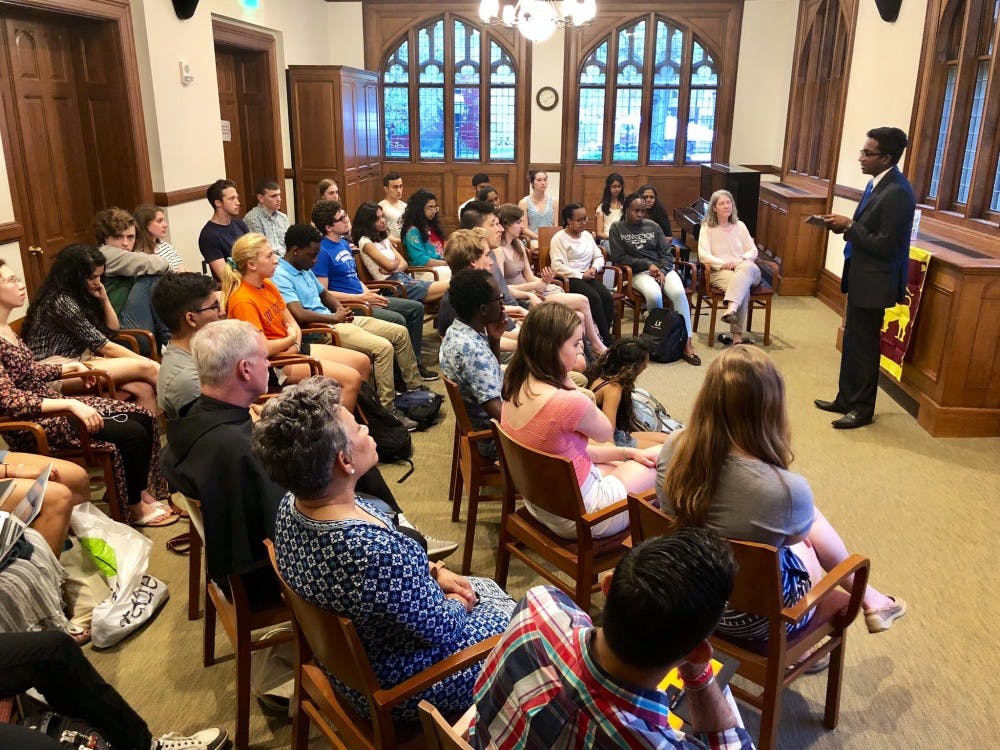Every chair was filled, with students waiting outside, as the community came together to pray and reflect on the bombings in Sri Lanka.
Reverend Dr. Alison L. Boden, Dean of Religious Life and the Chapel, expressed her concern that the vigil held for the tragedy of the New Zealand mosque attack was only a few weeks prior. She urged the vigil-goers to “come together in this space” and that during the vigil there might be times of quiet reflection and solidarity.
She was followed by Sri Lankan student Mahishan Gnanaseharan ’20, who remarked on the previous tragedies in Sri Lanka, such as the 2004 Indian Ocean tsunami and the decades-long civil war that ravaged the country. He then delivered a poem entitled “What Have we Lost,” written in response to the Sri Lankan Civil War, in both Tamil and English.
Father Gabe Zeis, the chaplain for the Aquinas Institute, said that Sri Lanka hosts many religious groups.
“Part of my community, the Franciscan community, is there, in Colombo,” he said. The family of one of the Franciscan friars who lives close to the basilica was attacked, he said.
“We pray for them,” he continued. “It tears hearts apart. This thing that causes terror is destructive.”
He read the Peace Prayer of Saint Francis.
Vineet Chander, Coordinator for Hindu Life at Princeton University, followed by reading a prayer: “may the entire universe be blessed with peace and hope.”

Rabbi Eitan Webb read a text from the 2nd Century, “written by a person who was sentenced to death by his brother-in-law.”
According to Webb, the message of the passage is that it is not possible to praise the infinite because the infinite is larger than us. We can only praise the infinite when we recognize that we came from some place, he explained.
“Fighting darkness, fighting hatred, will never work,” he said. “You can’t fight darkness with a stick … But if you light a match, then all the darkness in the world runs away.”
Every single person is a candle, he continued; that light is not ours, but it is a gift.

“Because it is not ours, it has infinite power,” Webb said.
Fawaz Ahmad ’22 spoke as a representative of the Muslim community on campus. He shared with the vigil the similar feelings of anger, pain, and sadness that he and other members of the Muslim community felt after the New Zealand mosque attack on March 15.
“When it happened in New Zealand, I thought, ‘I have family that goes every Friday to my mosque and prays together. That could've been my family,’” Fawaz said. “This is no different. We feel the same pain as the families in Sri Lanka.”
He went on to give a prayer of guidance from the Quran.
Boden closed by saying that the community gave her hope and thanking everyone for being present.
“This is who we are meant to be to one another,” she said.
Mouhamed Ndiaye ’22, who attended the vigil, said that he was troubled that these kinds of events seem increasingly common.
“The first thing I feel is numbness because it seems like these things happen so often, and the second feeling is sadness — sad not only because the occurrence happened, but also the numbness that comes from seeing tragedies happen so often,” Mouhamed said.
Marisa De Silva ’20, who has family in Sri Lanka, came to be with the Sri Lankan community. The prayers were beautiful, she remarked.
“It was good to have at least one event where we thought about what happened and paid our respects to the victims,” she said.
The interfaith vigil was held on Tuesday, April 23, at 7 p.m. in Murray Dodge and was sponsored by the Office of Religious Life.








